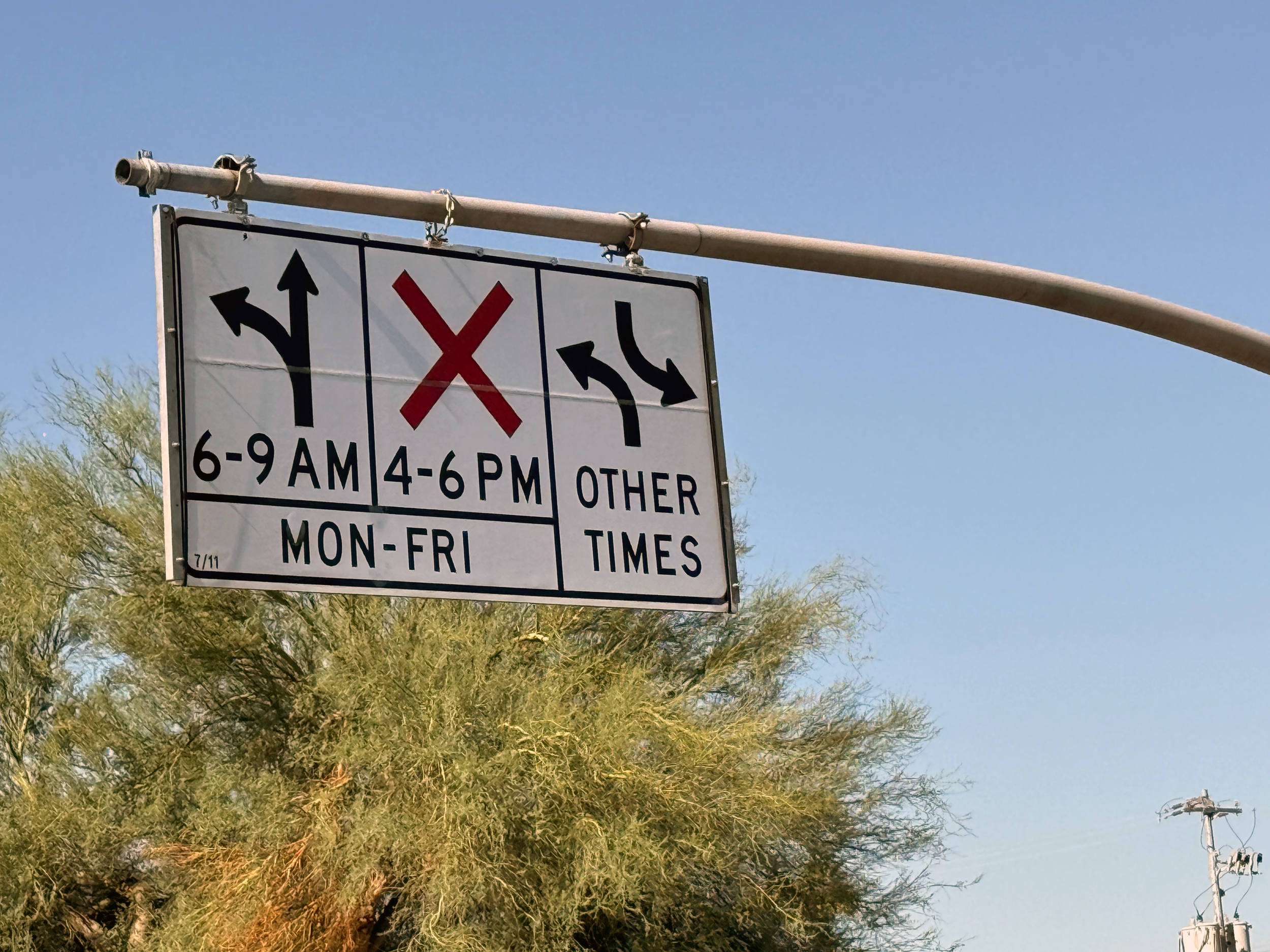Just One More Study: Process Delays Progress Once Again For Reverse Lanes
On May 21, the Phoenix City Council had a chance to demonstrate that they actually listen to their constituents. A petition to remove the baffling, outdated, and frankly dangerous reverse lanes on 7th Avenue and 7th Street came before them. Backed by more than 5,000 signatures, residents showed up in force. People packed the chambers: community members, business owners, longtime residents, and young people. All united around one undeniable fact: reverse lanes suck, and they need to go.
(Credit: Joe Golfen)
The lanes are confusing. They’re unsafe. They are a relic from the late 1970s. They serve no clear purpose in 2025 — if they ever did. No other major city in America uses them because they’re not a good traffic management policy. We now have better ways to move people: new and expanded freeways, expanded bus service, and light rail. Reverse lanes might have made sense in the 1970s, but so did smoking indoors, using leaded gasoline, and not going to therapy.
Read more: The Reverse Lanes Are Outdated. Here's Why It's Time for Phoenix to Move On.
To their credit, Council members nodded along sympathetically. They said they totally understood the frustrations. They agree that the reverse lanes are bad. Some even shared their own frustrations with using the reverse lanes. But instead of letting their lived experiences inform their leadership, they put it in the backseat. They boxed themselves into a trap of their own making because once it came time to take action on the petition, they fell back on a familiar excuse: process. They supported a recommendation - a clear delay tactic - by the Streets Department to conduct yet another study.
Local governments love process over progress.
Local governments often use procedural tools, intended for accountability and fairness, to delay or obstruct progress. In the case of reverse lanes, City officials are delaying decision-making by calling for additional studies, outreach, or committee reviews. This creates the illusion of action while using delay as a tactic to avoid politically risky decisions and accountability.
I get wanting to make decisions based on evidence. But this isn’t a new issue. Reverse lanes have been studied. Modern traffic management practices do exist. There is nothing special about Phoenix versus other cities in America that would justify being the only major city in America keeping the reverse lanes. We already know they create safety concerns, especially for pedestrians, cyclists, and drivers alike. And despite the claim from supporters of the reverse lanes that removing the lanes will increase traffic congestion, the actual impact is minimal when you consider the fact that this claim by the City is based on street and transportation infrastructure that didn’t exist when the claim was made. This isn’t traffic management. It’s a liability in the center of the 5th largest city in America.
For the Streets Department and the City Council, this is not a case of needing more data. It’s about not wanting to make a decision that might upset the status quo — a status quo that prioritizes car throughput at all costs, even if that cost is lives, missed economic opportunities, and overall community wellbeing.
It’s time to make the right decision
Another study won’t tell us anything new. What it will do is buy more time. Delay accountability while the leaderless Streets Department tries to find their car keys and Council puts off a real decision down the road. Then all progress on street safety will be delayed even further as new leadership in the Department comes into shape, whenever that happens. This is why the Council pushing a real decision further down the road is such a clear delay tactic. They want to use process to absolve themselves from responsibility on this issue.
We are told to be patient. Work the process and hope that our advocacy within this system works out. But when it comes to handing out tax breaks, fast-tracking development deals, or spending millions to widen roads, things move fast. It’s only when the public demands safer streets and when healthier neighborhoods are on the line, that city leadership suddenly rediscovers the virtue of caution.
Supporters of removing the reverse lanes aren’t asking for a radical shift overnight. We’re simply asking City leaders to stop pretending the issue is a lack of information. The real issue is a lack of leadership.
At some point, we must stop studying our city to death and do something.
Phoenix deserves better than reverse lanes. And we deserve politicians who lead, not manage the status quo.
Join the Movement
Momentum is building. More than 5,000 residents—from lifelong neighborhood advocates to new transplants who want better connectivity and safer street design—have signed the petition to end the reverse lanes. That’s 5,000 people standing up for safer streets, stronger small businesses, and a smarter vision for Phoenix. Every signature sends a clear message: this is not a fringe issue—it's a citywide priority.
Add your voice and join the growing coalition calling for change at EndReverseLanes.com.
Take Action:
Email your council member: Find your Phoenix council district and contact info here
Attend any upcoming meetings (sign up for UPP’s newsletter to stay up to date on public meetings regarding the reverse lanes)

